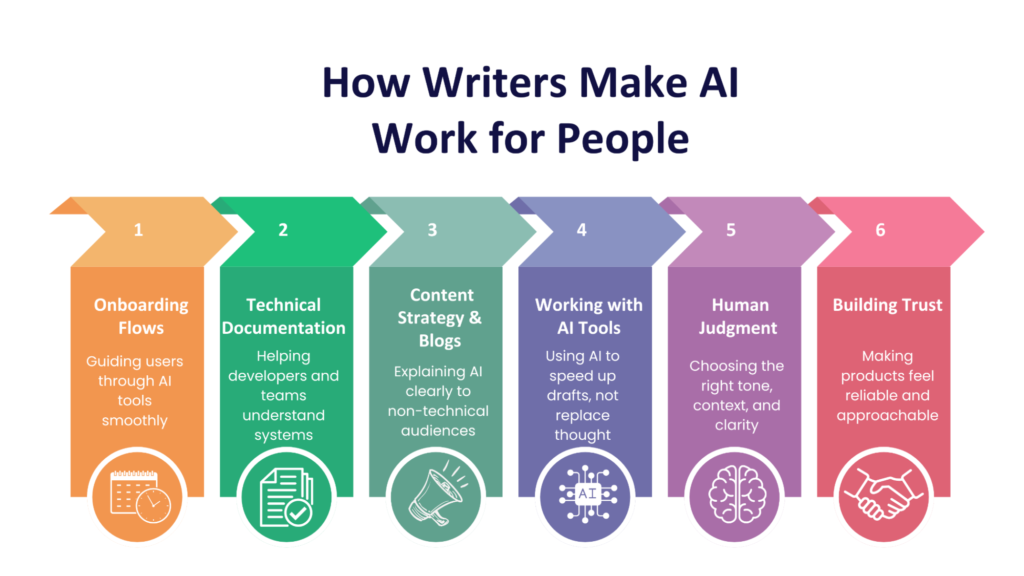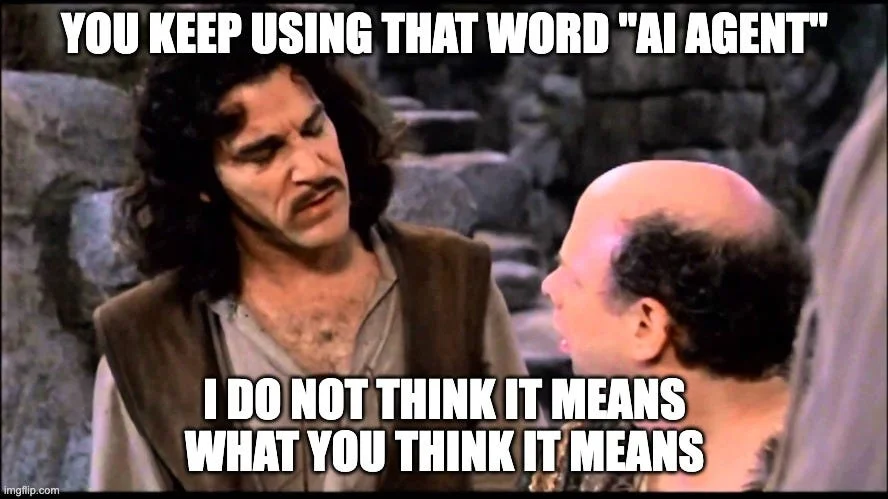“So… you write about AI, not code it?”
“Is that even a full-time thing?”
“I thought only engineers worked in tech.”
If any of that sounds familiar, you’re not alone. As AI becomes part of everyday life, the need for people who can explain it clearly is growing fast, and technical writers are making that possible.
AI tools have become part of everyday life, but most people still do not see the complexity behind how they actually work. What was once a behind-the-scenes technology is now shaping everything from the apps we use to how businesses operate. Tasks that used to take hours can now be completed in seconds.
Yet, for all the power AI brings, it does not explain itself. Algorithms cannot tell their own stories, and neural networks cannot guide users through how they work. That is where writers step in. They take complex ideas and translate them into content that people can understand, trust, and use with confidence. This communication is essential to helping more people adopt AI in their daily lives and work.
As AI keeps growing, it’s opening up many new job opportunities and helping more people find work in different fields. A recent report by Bain & Company projects that India’s AI sector will generate 2.3 million jobs by 2027. This growth isn’t limited to engineers alone. These roles go beyond just engineering. There is a rising demand for technical writers, AI trainers, and communication specialists, people who can make AI more approachable and easier to use.
In this article, we will take a look at why becoming a technical writer today can lead to a successful career in the world of AI. Let’s get started!
The AI Boom: More Than Just Hype
ChatGPT began as a simple chatbot designed to help with everyday tasks. Today, it supports students with assignments, assists professionals with daily workflows, and even helps people make personal decisions. What started as a tool for basic interaction has evolved into something far more capable and embedded in daily life.
A major driver behind this growth is generative AI, or GenAI, which can produce text, images, and code. Businesses are now tailoring GenAI to specific industries, making it faster, smarter, and more aligned with real-world needs.
At the same time, a newer concept is gaining momentum: agentic AI. These are systems that can take independent actions without needing constant human input. According to a report by Gartner, by 2028, nearly one-third of enterprise software is expected to include agentic AI, automating up to 15% of routine tasks. This is changing how companies operate, simplifying repetitive work and speeding up decision-making in areas like healthcare, finance, and education.
In the early days, AI jobs focused mainly on engineering. Most roles involved building models, writing code, and shaping the technical foundation. That focus has expanded. As AI becomes part of the tools used in everyday work, the need for a broader range of skills is growing quickly.
Companies now need researchers to push the boundaries of what AI can do, analysts to interpret complex data, and UX designers to create smooth and intuitive user experiences. There is also a growing demand for writers who can explain it all in a clear and helpful way.
The way something is explained can make a big difference in how people use it. When AI tools feel too complex or filled with jargon, they often end up underused or misunderstood.
Writers help solve that problem. They create content that guides users through new features, simplifies technical language, and makes the experience more intuitive. As AI becomes a part of more products and services, the need for clear, user-focused content will only continue to grow.
The Role of Writers in an AI-Powered World
AI tools are becoming more advanced and integrated into our daily lives, but without the right words, much of their potential can get lost. Technology might power the experience, but it is content that guides it.
Writers make this connection possible. They create onboarding flows that help people get started, technical documentation that supports developers, and blog posts that explain complex ideas in a way anyone can understand. This kind of work helps people trust the product, use it better, and see real value in what it offers.
Writing does more than just describe a tool. It gives context, simplifies complexity, and builds the bridge between technology and everyday use. As AI becomes more advanced, this kind of user-focused communication is becoming essential, and it is not optional anymore.
And yes, the obvious question comes up. If tools like ChatGPT can write, do we still need writers? The answer is more than ever. AI can speed up drafts, suggest ideas, and offer to phrase. But it cannot replace thoughtful writing and human touch. Writers bring judgment, voice, and clarity in a way that LLMs alone can’t.
AI tools may help speed up writing, but they haven’t replaced the need for good writers. In fact, the demand has only grown. That’s because it still takes a real person to decide what to say, choose the right tone, and make the content feel simple, helpful, and human.

Why Specialize in AI, Not Just Tech or IT
Most tech fields follow a known path. You learn the tools, understand the systems, and work within what’s already defined. AI is still evolving, still raising questions, and is being shaped by the people who work in it. And it’s exactly where writers are finding their place. They help people make sense of something new and advanced that is not always easy to explain.
AI is no longer just experimental. According to McKinsey, 78% of organizations now use AI in at least one business function, up from 55% in 2023. This change reflects growing trust and deeper investment in making AI part of daily operations.
Writing for AI as a technical writer puts you close to the core of innovation. You might get to work with researchers, engineers, and product teams to explain how models work, outline ethical considerations, or show real-world use cases.
This kind of writing goes beyond accuracy. It requires clarity, depth, and a strong understanding of the audience. The readers are not limited to developers. They include professionals from marketing, legal, healthcare, education, and public policy. These individuals are not just looking for technical specifications. They want context. They want to understand what the AI system does, why it should be trusted, and how it will affect their workflows.
Effective writing answers those questions. It bridges the gap between innovation and real-world application. Breaking down complex technology helps people understand it clearly and evaluate it thoughtfully.
Startup vs. Enterprise Writing: What You Gain
Your growth as a writer depends a lot on the environment in which you work. In large enterprises, technical writers often work within fragmented workflows. One person outlines the idea, another drafts it, and another revises or publishes it. With limited visibility into the whole process, you’re often left filling in gaps or guessing what the original intent was. In a field where clarity matters, this lack of continuity can slow both learning and output.
On the other hand, startups offer more hands-on and complete experience. Writers here do not execute someone else’s plan. They bring their ideas, shape the direction, and craft content that reflects their voice and thinking. They are involved from the start to the end. This kind of ownership speeds up learning, deepens impact, and makes the work feel more meaningful.
Working at a startup like Scribe of AI gives you the opportunity to:
- Exposure to diverse formats: You might work on product documentation, onboarding guides, blog posts, client explainers, or case studies. You learn to tailor your writing to different audiences and objectives.
- Faster learning cycles: You get frequent feedback that helps you see what connects and what falls short. Over time, you understand how your content directly shapes the user experience.
- Creative ownership: You manage the whole process from the first draft to the final edit. This deep involvement sharpens your writing skills and your strategic thinking.
If you’re exploring writing roles, especially in a growing AI company, startups offer a closer view of innovation. And if you’re aiming for a career where your words help shape the direction instead of simply following it, working at a startup is a great place to begin.

Why Scribe of AI Is Hiring Writers Like You
At Scribe of AI, we play an active role in shaping how people understand artificial intelligence. We are a writing and research company fully dedicated to AI, and we work closely with startups, research labs, and product teams. We aim to turn complex ideas into content that feels clear, engaging, and trustworthy.
As AI finds its way into more industries, the need for thoughtful communication is growing quickly. That’s where strong writers can make a real difference. We are now expanding our team and looking for writers with technical accuracy and writers who write with insight, clarity, and a sense of human connection.
As AI companies grow and build quickly, they need writing that makes their work easier to understand. They need content that is thoughtful, well-researched, and approachable. This could be through a blog post, a case study, or a product guide. What matters most is that the writing is reliable, fact-based, and easy to follow.
At Scribe of AI, writers explore, learn, and shape how people understand AI. Here’s what that experience looks like:
- Exclusive focus on AI: We work only on AI-related topics, so you’ll get to explore real-world tools, products, and in-depth research, not just skim the surface.
- Research-first mindset: We focus on clarity and accuracy, not just speed. You’ll have the time and support to explore the details, verify facts, and find the right sources.
- Writers who code, coders who write: You’ll work with developers and researchers who understand writing and writers who understand technology. This shared understanding helps projects move faster.
- Startup-style variety: Different clients have different needs, so you’ll work on various topics and formats. No two projects are the same; every assignment brings something new and meaningful.
If you’re eager to contribute to a team that’s helping the world understand AI, we’d love to hear from you. Reach out and email us at abirami@scribeofai.com to become a part of our journey to make AI accessible to all.
Key Takeaways
AI is already here, shaping how we work, learn, and solve everyday problems. But for it to truly make an impact, people need to understand how it works and why it matters. That understanding begins with writing that is clear, thoughtful, and grounded in real context.
Writing in AI means engaging with ideas that are shaping tomorrow. You get to learn from the people building new technologies and turn that knowledge into content that helps others understand what’s changing and why. It’s a path that keeps you curious, challenged, and connected to something bigger.
This path is also a smart way to build a career that grows with the industry. The topics are meaningful, the learning is constant, and the impact is real. If you want to be where AI meets real-world impact, Scribe of AI is hiring. Join us and help make complex ideas clear, human, and helpful.
This article was contributed to the Scribe of AI blog by Shivani Sharma.
At Scribe of AI, we spend day in and day out creating content to push traffic to your AI company’s website and educate your audience on all things AI. This is a space for our writers to have a little creative freedom and show-off their personalities. If you would like to see what we do during our 9 to 5, please check out our services.




